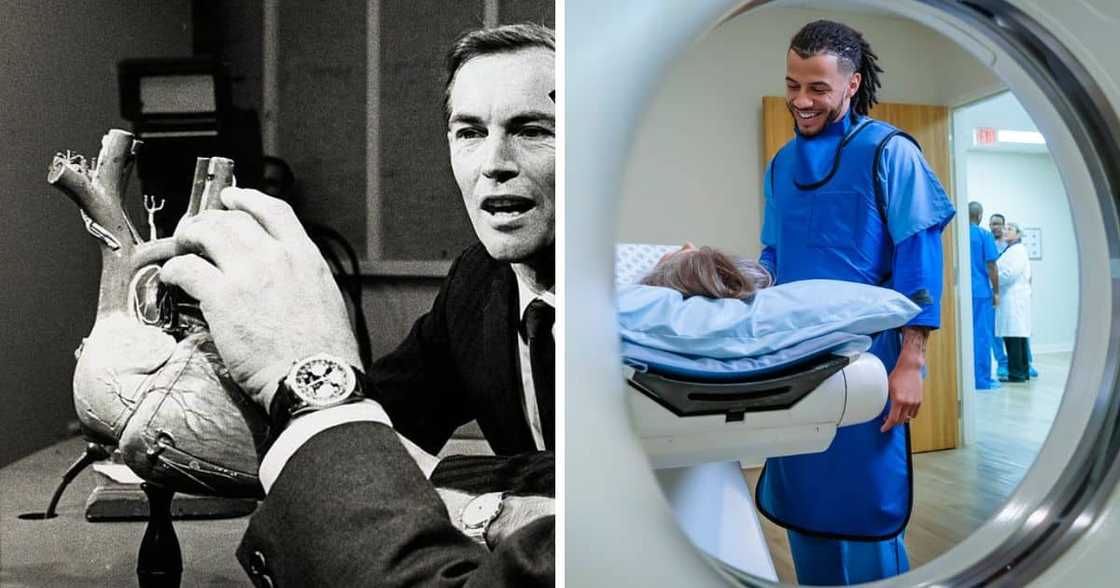10 South African Tech Innovations Invented Right Here in Mzansi That Make Us Proud
- South Africans are built with lots of ingenuity and we have lots to show for it, with groundbreaking inventions that changed the world, such as CAT scans and the Kreepy Krauly
- Chris Barnard performed the world's first heart transplant in 1967 in Cape Town and he was lauded around the world and showed that the complicated procedure could be successful
- We take a look at 10 innovations by South Africans and how they laid the foundation for more to follow in their achievements
PAY ATTENTION: Follow Briefly News on Twitter and never miss the hottest topics! Find us at @brieflyza!
There are some obvious inventions or firsts that most South Africans know were local inventions, such as the world's first heart transplant. But there are also some obscure feats that many people might know were discovered locally, we've made a list of the 10 most prominent achievements.

Read also
People of Mzansi seem to be silent ballers as 60 000 SA people joined the millionaires club in 2021

Source: UGC
1. Q20
72 years ago, the multi-purpose lubricant Q20 was created by Mr Robertson in KwaZulu-Natal, according to the company's website. It became a staple across the country and then the world as one of the best products to deal with rust prevention and to keep every household item lubricated.
2. Kreeply Krauly
South Africa is a country that experiences very high temperatures during summer, and therefore many people have pools. However, maintaining them can become tiresome and expensive. Enter the Kreeply Krauly in 1974, which was invented by South African Ferdinand Chauvier, a hydraulics engineer, according to the South African. It uses a pool pump to funnel air into what is essentially a vacuum cleaner that sucks up leaves and other debris.
PAY ATTENTION: Never miss breaking news – join Briefly News' Telegram channel!
3. Computicket
The world's first computerised ticketing system was launched in 1971, reports News24. Benoni resident and avid theatre-goer, Percy Tucker, became frustrated at the long queues people waited in to buy tickets. Computicket is still a leader in the industry and continues to develop new ways of assisting customers to purchase tickets to events.
4. Speed gun radar testing device
South African Henri Johnson is the whizz behind the radar gun that measures the speed of a ball being bowled in cricket and a serve in tennis, First Car Rental reports. First used in 1992 it uses radio waves to measure the speed at which they reflect back to the gun.
5. Pratley Putty
A South African invention made the trip to the moon in 1969 when Neil Armstrong became the first man to set foot on the planet. The adhesive product is called Pratley Putty and it was created by George Pratley and was famously used on the Nasa's Apollo XI that went to the moon, according to the company's website.
6. Dolos
If the word doesn't ring a bell, try picturing the massive concrete blocks located at harbours all over the world. They're called dolos and we have South African Eric Merrifield to thank for developing them over 60 years ago. Their purpose is to protect harbour walls and breakwaters from erosion. They can weigh up to 80 tonnes and their geometric design protects the shore while not being dislodged, according to CapeTown Etc.
7. CAT Scan
One of two medical inventions on the list is the Computed Axial Tomography scan, which uses X-rays to create 3D images of the body. It provides doctors with more information than a 2D image. It was invented by the 1979 Nobel Prize winner in Physiology or Medicine Allan MacLeod Cormack and British engineer Godfrey Hounsfield of EMI Laboratories, according to the South Coast Herald.
8. World's first heart transplant

Read also
FoondaMate helps students study better via WhatsApp and now the SA startup has R31 million to expand its resources
On 3 December 1967, Louis Washkansky underwent a successful heart transplant at Groote Schuur Hospital in Cape Town. It was the first time it had ever been achieved and the team was led by Dr Christiaan Barnard. The feat put South Africa on the map and Barnard went on to do 10 more procedures. Unfortunately, Washkansky died almost three weeks later from pneumonia, according to SA Good News.
9. World's first digital laser
On 2 August 2013, a team of researchers at South Africa's Council for Scientific and Industrial Research (CSIR) published their findings in the Nature Communications journal that they could show that laser beams can be digitally controlled from within a laser device, according to the CSIR. The digital laser was used in surgical technology in hospitals, among other things.
10. Sasol - First company to produce oil from coal
South Africa's only oil producer Sasol was the first company to produce oil from coal. The parastatal has produced almost 1,5 billion barrels of synthetic fuel from about 800 million tonnes of coal since the first sample of synthetic oil from coal was produced on 23 August 1955, according to its website.
SA billionaires Nicky Oppenheimer and Douw Steyn named on UK’s Top 100 rich list, South Africans react
Two South African businessmen made it onto the United Kingdom’s Sunday Times Rich List for 2022. The list is updated on an annual basis, Briefly News reports.
Billionaire Nicky Oppenheimer, who is known for his role in the diamond and mining industries, along with his family, was placed 24th on the list. Insurance billionaire Douw Steyn grabbed the 84th spot on the rich list with a fortune of R42 billion
Oppenheimer’s fortune is worth about R129 billion, his fortune reportedly grew by R1.3 billion since the last list was published.
Source: Briefly News




